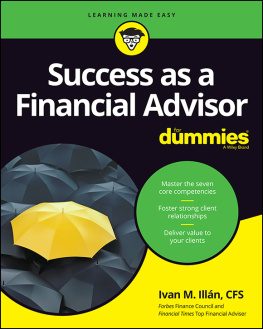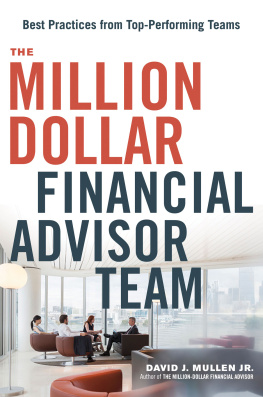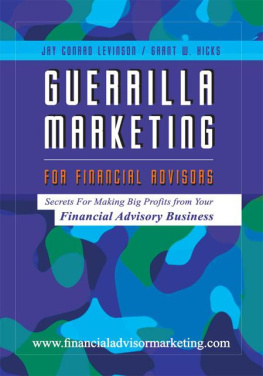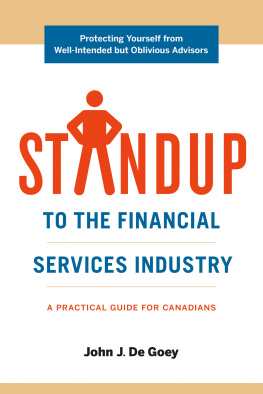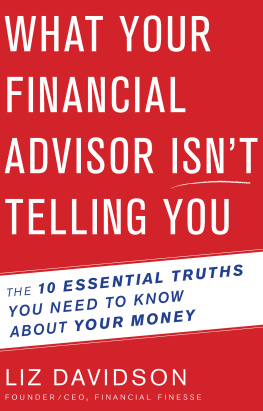A POST HILL PRESS BOOK
ISBN: 978-1-68261-775-5
ISBN (eBook): 978-1-68261-776-2
The Truth Shall Set Your Wallet Free:
Secrets to Finding the Perfect Financial Advisor
2018 by Nicholas W. Stuller
All Rights Reserved
No part of this book may be reproduced, stored in a retrieval system, or transmitted by any means without the written permission of the author and publisher.

Post Hill Press
New York Nashville
posthillpress.com
Published in the United States of America
To my wife Kara for her amazing understanding, patience and support
To my daughter Tallulah for her unconditional love
Contents
INTRODUCTION
Billionaires, millionaires, middle class, and anyone in financial distress can benefit by reading this book. I have attempted to provide a thorough education on the financial advisor universe, with information that can help everyoneregardless of their income or asset levelsfind an ideal financial advisor. For those who have never hired an advisor, you will get the most benefit from The Truth. If you have an advisor but are uncertain about how best to work together, you will learn more about how advisors work and youll be better prepared to ask deeper questions. Even if you are well-versed in how advisors work, you will still discover some valuable nuggets to improve the results from your advisor relationship.
I have been in the financial services industry for more than thirty years and every year, it becomes more apparent to me that consumers desperately need financial advisors. The financial world becomes increasingly complexand yet, consumers knowledge of advisors does not seem to change much. Investors seem to make the exact same mistakes year in and year out, and less than half of Americans use a financial advisor. In my opinion, thats far too low a number. For a point of clarity, throughout the book I use the terms consumer and investor in what may appear to be an interchangeable basis. My use of consumer relates to someone who doesnt yet invest, but needs some kind of adviceusually a financial plan or some discrete advice as part of a plan. An investor is someone who is currently investing in some type of securities.
The subtitle of the book has the word perfect in it. For purposes of the book, perfect is defined as perfect for you at this time in your life. Advisors are people, and as such, will and do make mistakes. Your perfect financial advisor at this time in your life may very well be a bad fit for someone else, and vice versa. Financial advice is a mix of art and science; therefore, the human interaction component is important. As I explain in this book, if you are given the best advice ever known to man, but you do not use that advice for one reason or another, the advice is useless. The message, the messenger, and the recipient all have important roles in the advice dynamic.
I firmly believe every adult in the United States should get a financial advisor. To be certain, families lives can be greatly improved with the right advice and made more comfortable. But there is another reason to get professional financial help, and that is to be defensive. The wonderful advancements in health care, life expectancy, and technology will have a financial effect that will be devastating for some. Consider: in this lifetime, entire industries will be disintermediated, while at the same time we all will live longer. This leaves those affected in a financial quandary...and an emotional one, at that. Having the foresight to deal with seismic shifts, and deal with them calmly, is simply not a reasonable expectation. In this situation, the risks of making a significant financial mistake can be significant.
Throughout this book, you will read about various types of people I have interviewed. There are consumers, investors, financial advisors, and senior leaders of firms that support advisors. Their stories are all terrific, and you will likely learn something from each one. It is important to note that many of the investor interviews are with people whom I was only recently introduced to by others. The randomness of how I came to them is informative, as they all have the common theme of not knowing how advisors could have improved their lives.
I am not an advisor, so outside of more copies of this book being sold, I do not benefit if more people get a financial advisor. If the percentage of advised families does not change, all the current financial advisors will be just fine. In fact, there is a shortage of advisors, so as older advisors retire, younger advisors will benefit even more. The reason I wrote this book is that I have a great interest in seeing more families improve their financial well-being.
To be clear, I am aware the financial advice industry is not a perfect one; simply put, there are bad actors in the industry. However, spending seven years in regulatory compliance gave me a unique insight in how to reduce the chances of encountering the wrong type. I also have the valuable experience of building database companies where I saw how many advisors had problematic histories, though thankfully, the bad actor rate is low. Most importantly, I have worked very closely with advisors for years, witnessed their investments first-hand on behalf of clients, and spent time with advisors watching them collaborate in furtherance of their clients. In this book, I will show you how to reduce your risk of encountering the wrong advisor and how to recognize the best ones.
My hope is that after reading this book, people will feel more comfortable reaching out and engaging with advisors, or at least be less wary of doing so. My long-term goal is for consumers and investors to change the way they feel about financial advisors and see them more like medical doctors or attorneysas professionals who are needed for an optimal life. There is a perfect financial advisor out there for you, regardless of your income or asset level, and armed with the information in this book, you will be prepared.
[ CHAPTER 1: ]
Why We All Need
Financial Advisors
In todays complex world, most people who are building careers need professional help to organize their finances. The reason: Maneuvering the personal finance world is complex because there are myriad savings and investment options. Rather than risk making bad financial decisions, we can hire financial advisors who will fashion a financial strategy that meets the essential parameters of our lifestyles. The result: A strong personal balance sheet and peace of mindan idyllic state that hardworking Americans deserve. Leading a stress-free life in a frenetic world moving at warp speed has ascended to a moral imperative.
Events of the recent past have proven that millions of Americans have paid a hefty price for shoddy financial guidance. When you consider the cost to low-income families with no life insurance, middle-income families who unwisely chase that heavily touted hot stock, and multimillionaires swindled by that so-called friend at their country club, the cost to society spirals into the trillions. The upsetting fact is that these often-crippling costs are avoidable.
When hardworking Americans are taken to the cleaners by glib, fast-talking con artists who pretend to be financial professionals, theyre understandably enraged. Once trusting and open-minded, theyre suspicious and wary of all financial professionals. At this point, reason goes out the window. There is great truth to the expression once bitten, twice shy. Consensus thinking goes like this: If one financial advisor is a crook, they must all be crooks. Its illogical, flawed reasoning, but understandable.


